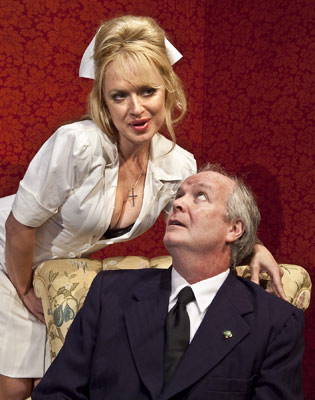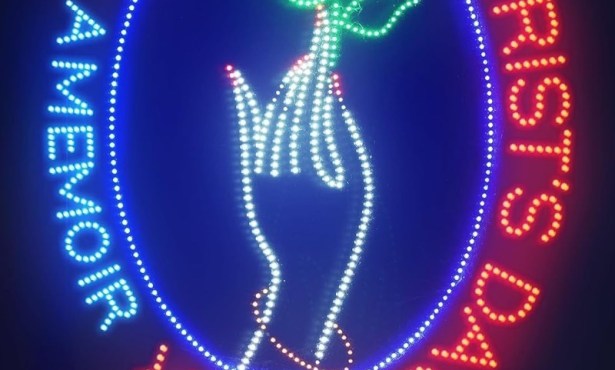ETC Presents Loot
Joe Orton’s Loot Gets Santa Barbara Production
“Subversive comedy” is a label attached to many plays, but few fit that description as well as the ferocious comedies of Joe Orton. The 1960s British playwright, who mixed the wit of Oscar Wilde with the menace of Harold Pinter, aggressively challenged conventional thinking and behavior, mercilessly pointing out that the platitudes we swear by bear little relationship to our actual actions.
Thanks to his skill as a dramatist, this disconnect reliably produces laughter, as characters find creative ways to justify their self-serving behavior and hold onto their self-image as upright citizens. His goal was to both entertain his audiences and shock them out of their complacency—an attitude that places him firmly in the anti-establishment 1960s, but also ensures his continued relevance. Self-deception and hypocrisy will never go out of style, and neither, one suspects, will Orton.

“He has some of the spirit of the Beatles,” said Ensemble Theatre Company artistic director Jonathan Fox, whose production of Orton’s 1966 farce Loot opens Thusday night at Alhecama Theatre. “He rivals Wilde and [George Bernard] Shaw in terms of his genius, and yet many people are not familiar with his work.
“His wit was so keen,” Fox added. “There’s a joke in every other line, if not every line. It keeps you on your toes. There’s a verbal playfulness that keeps it very alive.”
Orton is probably best-known today as the protagonist of Prick Up Your Ears, an acclaimed 1987 film based on John Lahr’s biography. It paints a portrait of a devout nonconformist who lived dangerously and died violently at age 34. Orton was murdered by his male lover on August 9, 1967; Harold Pinter spoke at his funeral.
Loot, Orton’s biggest success during his lifetime, was written in 1964, revised in 1965, and staged on London’s West End in 1966, to considerable critical acclaim. It takes place in a dowdy English household in which the embalmed body of one Mrs. McLeavy lies in her coffin awaiting burial. She is not given an opportunity to rest in peace.
“The entire corpse—and parts thereof—gets strewn around quite a bit,” noted veteran actor Ned Schmidtke, who plays the brutal, borderline-insane police detective Truscott (whom Orton based on a real person). The late woman’s bisexual son and his companion, who have just robbed a bank, periodically remove her body and put it back in an attempt to hide the stolen cash.
Meanwhile, we learn that the late woman’s former nurse, Fay, is implicated in her death—and a number of others. “It is quite dark and pretty shocking,” Fox said. “Orton thought it should be shocking. A lot of the comedy is nervous comedy. There is plenty of greed and lust—the typical elements of farce.”
“The structure of the play is quite extraordinary,” he added. “It’s not just one door slamming and another opening. In fact, there’s very little of that in the play. It’s more about people doing ridiculous things in moments of desperation. The stakes are high.”
Orton insisted that the acting in his plays be “realistic,” in spite of their outrageous content; he was enraged when, during the West End run of Loot, the actors started camping things up. Fox understands his desire, but also has some sympathy for that first cast.
“It’s so difficult to figure out how to approach him,” he said. “If you go too far, it doesn’t work, but if you don’t go far enough, it doesn’t work. There’s a lot of dark stuff going on. I think part of the challenge is to not play the darkness too much.”
Darkness indeed. In Orton’s world, policemen are sadistic thugs, nurses are killers, supposedly grieving sons care only about cash, and the one character who actually believes the reassuring pieties of his society is proven to be a fool.
“Like Wilde in The Importance of Being Earnest, Orton as homosexual playwright assumes the stance of alien, outsider, critic, and satirist of all the values that straight middle-class society most cherishes,” wrote theater scholar Maurice Charney. “There is a cheerful anarchy about Orton’s works, in which nothing can be assumed, and in which all values—including the shibboleths of sexuality—are up for grabs.”
“Orton fanned the controversy when it was first produced,” Fox noted. “He wrote letters to the editor under an assumed name—Edna Welthorpe—taking issue with the morality of the play, and how disgraceful it was.”
“I think audiences today will be less shocked by it than audiences in the ’60s; I think it definitely fits the aesthetic of today’s young people. But there are a few moments that will take the audience aback a bit.”
Orton wouldn’t want it any other way.
4•1•1
Loot is at Alhecama Theatre June 3-27. Call 965-5400 or visit ensembletheatre.com for tickets and information.



